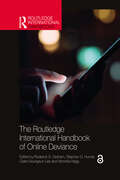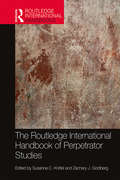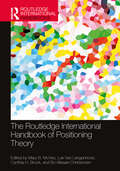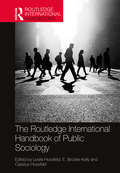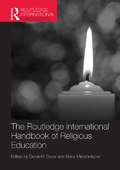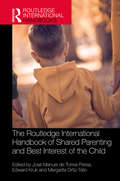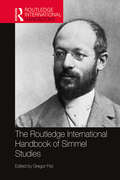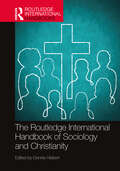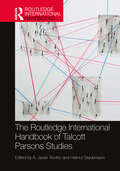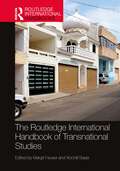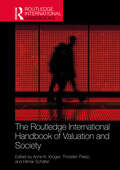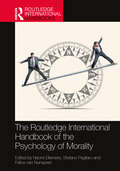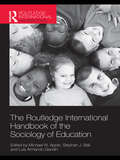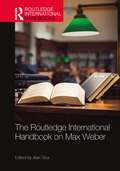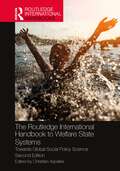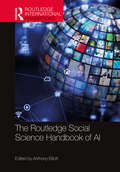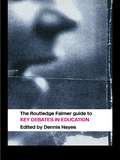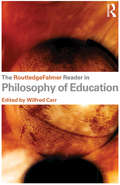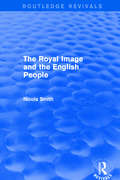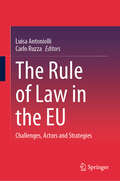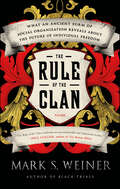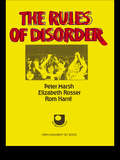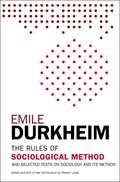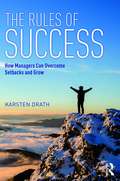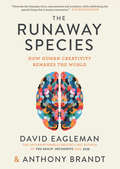- Table View
- List View
The Routledge International Handbook of Online Deviance (Routledge International Handbooks)
by Claire Seungeun Lee Veronika Nagy Roderick S. Graham Stephan G. HumerCovering a wide range of different online platforms, including social media sites and chatrooms, this volume is a comprehensive exploration of the current state of sociological and criminological scholarship focused on online deviance.Understanding deviance broadly, the handbook acknowledges both an objective normative approach and a subjective, reactivist approach to the topic, putting into sharp relief the distinctions between cybercrime and online deviance on the one hand, and wider concerns of online communities related to online deviance on the other. Divided into five sections, the first section is devoted primarily to scholarship about the theories and methods foundational to exploring online deviance. The second section, “Gender, Sex, and Sexuality”, presents empirical research on expressions of gender, sex, and sexuality in online spaces considered deviant. The third section, “Violence and Aggression,” highlights scholarship on types of violent communications such as hate speech and cyberstalking. The fourth section, “Communities and Culture,” describes empirical research on online communities and networks that can be described as deviant by wider society. Lastly, the fifth section, “Regional Perspectives,” highlights research in which a terrestrial location is impactful to the online phenomena studied.Providing a window into future scholarship over the next several years and acknowledging the ephemeral nature of research on digital technology, The Routledge International Handbook on Online Deviance is essential reading for students and scholars of Criminology and Sociology focused on deviant online behaviour. It will also appeal to those working in related areas within Internet/Digital Studies, Media/Communication Studies, Psychology, and Cybersecurity.
The Routledge International Handbook of Perpetrator Studies (Routledge International Handbooks)
by Susanne C. Knittel Zachary J. GoldbergThe Routledge International Handbook of Perpetrator Studies traces the growth of an important interdisciplinary field, its foundations, key debates and core concerns, as well as highlighting current and emerging issues and approaches and pointing to new directions for enquiry. With a focus on the perpetrators of mass killings, political violence and genocide, the handbook is concerned with a range of issues relating to the figure of the perpetrator, from questions of definition, typology, and conceptual analysis, to the study of motivations and group dynamics to questions of guilt and responsibility, as well as representation and memory politics. Offering an overview of the field, its essential concepts and approaches, this foundational volume presents contemporary perspectives on longstanding debates and recent contributions to the field that significantly expand the theoretical, temporal, political, and geographical discussion of perpetrators and their representation through literature, film, and art. It points to emerging areas and future trends in the field, thus providing scholars with ideas or encouragement for future research activity. As such, It will appeal to scholars across a range of disciplines, including sociology, anthropology, criminology, philosophy, memory studies, psychology, political science, literary studies, film studies, law, cultural studies and visual art.
The Routledge International Handbook of Positioning Theory (Routledge International Handbooks)
by Luk Van Langenhove Cynthia H. Brock Mary B. McVee Bo Allesøe ChristensenThis handbook is the first of its kind to explore Positioning Theory. Taking inspiration from the groundwork set by Rom Harré and collaborators such as Bronwyn Davies, Fathali Moghaddam, Luk Van Langenhove, and others the book explores the emergence, historical context, and disciplinary applications of Positioning Theory and its basic precepts as a social psychological theory.This volume encompasses over 20 chapters across four sections, assimilating cross-disciplinary insights that try to understand the theoretical underpinnings, methodological applications, and contemporary relevance of Positioning Theory. Part 1 explores the movement of scholarly figures and their numerous works on the subject. It discusses the foundational origins and the historical contexts of the existing theories on positioning and new directions for scholarship. Part 2 examines the methodological and narrative investigations used for data analysis in positioning research, navigating through the epistemological orientations and theoretical landscapes of Positioning Theory. Part 3 explores numerous applications across disciplines to consider the reach and influence of positioning within and across multiple disciplines. Lastly, the authors contemplate the future directions for Positioning Theory.Featuring researchers from leading research institutions from across the globe, the book is important reading for scholars interested in positioning and Positioning Theory. We recommend this handbook for graduate-level courses in social psychology, communication, discourse studies and related disciplines.
The Routledge International Handbook of Public Sociology (Routledge International Handbooks)
by Leslie Hossfeld; E. Brooke Kelly; Cassius HossfeldThis book brings together the work of public sociologists from across the globe to illuminate possibilities for the practice of public sociology and the potential for international exchange in the field. In addition to sections devoted to the history, theory, methodology and possible future of public sociology, it offers a series of concrete case studies of public sociology practice from experienced scholars and practitioners, addressing core themes including the role of students in public sociology, the production of knowledge by communities and the sharing of knowledge with a view to having an influence on policy. Presenting research that is truly global in scope, The Routledge International Handbook of Public Sociology provides readers with the opportunity to consider the possibilities that exist for international collaboration in their work and reflect on future directions. As such, it will appeal to scholars across the social sciences with interests in research with public impact.
The Routledge International Handbook of Religious Education (Routledge International Handbooks of Education)
by Derek H. Davis Elena MiroshnikovaHow and what to teach about religion is controversial in every country. The Routledge International Handbook of Religious Education is the first book to comprehensively address the range of ways that major countries around the world teach religion in public and private educational institutions. It discusses how three models in particular seem to dominate the landscape. Countries with strong cultural traditions focused on a majority religion tend to adopt an "identification model," where instruction is provided only in the tenets of the majority religion, often to the detriment of other religions and their adherents. Countries with traditions that differentiate church and state tend to adopt a "separation model," thus either offering instruction in a wide range of religions, or in some cases teaching very little about religion, intentionally leaving it to religious institutions and the home setting to provide religious instruction. Still other countries attempt "managed pluralism," in which neither one, nor many, but rather a limited handful of major religious traditions are taught. Inevitably, there are countries which do not fit any of these dominant models and the range of methods touched upon in this book will surprise even the most enlightened reader. Religious instruction by educational institutions in 53 countries and regions of the world are explored by experts native to each country. These chapters discuss: Legal parameters in terms of subjective versus objective instruction in religion Constitutional, statutory, social and political contexts to religious approaches Distinctions between the kinds of instruction permitted in elementary and secondary schools versus what is allowed in institutions of higher learning. Regional assessments which provide a welcome overview and comparison. This comprehensive and authoritative volume will appeal to educators, scholars, religious leaders, politicians, and others interested in how religion and education interface around the world.
The Routledge International Handbook of Shared Parenting and Best Interest of the Child
by José ManuelThis multidisciplinary volume offers an essential, comprehensive study of perspectives on the scope and application of the best interests of the child and focuses mainly on its application in relation to child custody. With expert contributions from psychological, sociological and legal perspectives, it offers scientific analysis and debate on whether it should be the primary consideration in deciding child custody cases in cases of divorce or separation or whether it should be one of several primary considerations. It explores complex dilemmas inherent in shared parenting and whether the advantages it offers children are sufficient when compared to attributing custody to one parent and limiting visitation rights of the other. Offering a comprehensive analysis of this complex topic, chapters provide detailed insight into the current state of research in this area, as well as expert guidelines aimed at resolving the controversies when parents agree or disagree over their children’s living arrangements. Cutting-edge topics explored include: transnational shared parenting; alternative dispute resolution; breastfeeding parents; religious disputes between parents and the psychological, social and economic factors that affect shared parenting. The Routledge International Handbook of Shared Parenting and Best Interest of the Child will be essential reading for scholars and graduate students in law, psychology, sociology and economics interested in shared parenting and family law.
The Routledge International Handbook of Simmel Studies (Routledge International Handbooks)
by Gregor FitziThe Routledge International Handbook of Simmel Studies documents the richness, variety, and creativity of contemporary international research on Georg Simmel’s work. Starting with the established role of Simmel as a classical author of sociology, and including the growing interest in his work in the domain of philosophy, this volume explores the research on Simmel in several further disciplines including art, social aesthetics, literature, theatre, essayism, and critical theory, as well as in the debates on cosmopolitanism, economic pathologies of life, freedom, modernity, religion, and nationalism. Bringing together contributions from leading specialists in research on Simmel, the book is thematically arranged in order to highlight the relevance of his oeuvre for different fields of recent research, with a further section tracing the most important paths that Simmel’s reception has taken in the world. As such, it will appeal to scholars across the social sciences and humanities, and to sociologists, philosophers, and social theorists in particular, with interest in Simmel’s thought.
The Routledge International Handbook of Sociology and Christianity (Routledge International Handbooks)
by Dennis HiebertThe Routledge International Handbook of Sociology and Christianity examines the intersection of the sociology of religion – a long-standing focus of sociology as a discipline – and Christianity – the world’s largest religion. An internationally representative and thematically comprehensive collection, it analyzes both the sociology of Christianity and Christian approaches to sociology, with attention to the Roman Catholic, Orthodox, and Protestant branches of Christianity. An authoritative, state-of-the-art review of current research, it is organized into five inter-connected thematic sections, considering the overlapping emergence of both the Christian religion and the social science, the conceptualization of and engagement with Christianity by sociological theory, the ways in which Christianity shapes and is shaped by various social institutions, the manner in which Christianity resists and promotes various forms of social change, and the identification, diagnosis, and correction of social problems by sociology and Christianity. This volume is an invaluable collection for scholars and advanced students, with special appeal for those working in the fields of sociology and social theory, as well as religious studies and theology
The Routledge International Handbook of Talcott Parsons Studies (Routledge International Handbooks)
by A. Javier Treviño Helmut StaubmannTalcott Parsons was the leading theorist in American sociology—and perhaps in world sociology—from the 1940s to the 1970s. He created the dominant school of thought that made "Parsonian" a standard description of a theoretical attempt to unify social science, as reflected in the fact that his contributions to the discipline cover a range of issues, including medicine, the family, religion, law, the economy, race relations, and politics—to name but a few. This volume brings together leading scholars working in the field of "Parsonian Studies" to explore the background of Parsons’s work, the content of his oeuvre, and his subsequent influence. Thematically organized, it covers Parsons’s contributions and impacts in areas including the philosophy and methodology of the social sciences; cultural sociology; personality, mental illness, and psychoanalysis; and economics and political and economic sociology. In addition, it considers his influence in different areas of the world and on particular students, and offers insights into the Parsonian tradition’s practical application to contemporary social issues. An authoritative, comprehensive, and in-depth critical assessment of the Parsonian legacy, The Routledge International Handbook of Talcott Parsons Studies will appeal to scholars across the social sciences and in sociology and social theory in particular, with interests in the history of sociology and the enduring relevance of Talcott Parsons.
The Routledge International Handbook of Transnational Studies (Routledge International Handbooks)
by Xóchitl BadaThe Routledge International Handbook of Transnational Studies offers a comprehensive overview of the dynamic evolution and the most recent debates in this interdisciplinary field. The collection assembles scholarship from the social sciences and the humanities that share a critical perspective extending beyond the nation-state. The contributions investigate sustained connections, events, and activities across state borders and acknowledge prevailing global power asymmetries. The handbook examines the dynamics of transnational processes across seven main themes: epistemological and methodological principles; transnational migrant practices and family remittances; mobilities and (self-)identities; social protection; organizations and social movements; culture, religion, and the arts; and architecture and urban planning. The contributors engage with theoretical developments and analyze empirical cases involving a wide array of critical contemporary topics such as expatriate voting, first- and second-generation return migration, state-sponsored cross-border marriages, access to health care, transnational social work, global religious aesthetics, transnational art corridors, literary translation, remittance-financed architecture, and transnational processes of real estate development and gentrification, among others. They display a series of cross-cutting approaches including postcolonial theory, racism, and gender, and a focus on agency, state policies and macro-structures, and transnational inequalities. This book features multidisciplinary scholars in transnational studies from Australia, Belgium, Canada, Finland, Germany, Italy, Malaysia, Mexico, the Philippines, Poland, Spain, Sweden, the United Kingdom, and the United States. This handbook will be of interest to scholars interested in global and transnational perspectives across a wide range of disciplines. It will serve as a key resource for academics, students, and other interested audiences seeking to familiarize themselves with the study of contemporary issues that cross state borders.
The Routledge International Handbook of Valuation and Society (Routledge International Handbooks)
by Anne K. Krüger Thorsten Peetz Hilmar SchäferThe Routledge International Handbook of Valuation and Society builds on the growing research interest in practices of valuation throughout contemporary society, providing an up-to-date overview of the different facets of research in the sociology of valuation.The handbook is divided into five major sections with attention to the treatment of valuation in major areas of sociological theory, as well as its key concepts, discourses, and approaches:Part I: Theoretical perspectivesPart II: Central valuation practices in societal spheresPart III: Cross-cutting valuation practicesPart IV: Valuation and societal changePart V: ReflectionsTogether, the chapters in this book characterize distinctive practices of valuation across different societal spheres, such as education and science, arts and culture, economic life, the environment or digital culture and social media. They also examine the role of valuation in contemporary society and consider the ways it effects social change.This seminal handbook aims at taking stock of the development of the study of valuation with a selection of topics that are important for understanding core perspectives and developments as well as anticipating its future orientation. It will appeal to scholars across the social sciences with interest in the ubiquity of the valuation practices and its effects on social life.
The Routledge International Handbook of the Psychology of Morality (Routledge International Handbooks)
by Naomi Ellemers Stefano Pagliaro Félice Van NunspeetThis cutting-edge handbook examines moral psychology and behavior, uncovering layers of human morality through a comprehensive overview of topics and approaches. Featuring an array of expert international contributors, the book addresses five key themes: moral reasoning, moral judgments, moral emotions, moral behavior and moral self-views. Each section includes empirical chapters that address these themes at the intrapersonal, interpersonal, intragroup or intergroup level. Each section starts with a reflective chapter from a leading scholar in this field of study who shares their personal vision on key issues and future developments. Drawing on emerging research and featuring real-world examples, the book offers a deeper understanding of the social psychological factors that shape our moral behavior and how this plays out in our daily lives. The Routledge International Handbook of the Psychology of Morality will be essential reading for academics and students in social psychology, the psychology of morality, business ethics and related areas. It will also be a compelling resource for legal and HR professionals, policy makers and anyone interested in understanding the complex and multi-faceted nature of human morality.
The Routledge International Handbook of the Sociology of Education (Routledge International Handbooks of Education)
by Stephen J. Ball Michael W. Apple Luís Armando GandinThis collection brings together many of the world’s leading sociologists of education to explore and address key issues and concerns within the discipline. The thirty-seven newly commissioned chapters draw upon theory and research to provide new accounts of contemporary educational processes, global trends, and changing and enduring forms of social conflict and social inequality. The research, conducted by leading international scholars in the field, indicates that two complexly interrelated agendas are discernible in the heat and noise of educational change over the past twenty-five years. The first rests on a clear articulation by the state of its requirements of education. The second promotes at least the appearance of greater autonomy on the part of educational institutions in the delivery of those requirements. The Routledge International Handbook of the Sociology of Education examines the ways in which the sociology of education has responded to these two political agendas, addressing a range of issues which cover three key areas: perspectives and theories social processes and practices inequalities and resistances. The book strongly communicates the vibrancy and diversity of the sociology of education and the nature of ‘sociological work’ in this field. It will be a primary resource for teachers, as well as a title of major interest to practising sociologists of education.
The Routledge International Handbook on Max Weber (Routledge International Handbooks)
by Alan SicaThis book explores the latest thinking about Max Weber and his continuing influence on theoretical and empirical interests today. Bringing together the work of leading scholars from a variety of disciplines, it illuminates Weber’s thought in a number of key areas, including the methodology and philosophy of social science, comparative religion, the rationalization process, political sociology, the sociology of law, and the Protestant ethic and the development of capitalism.An international collection that demonstrates the enduring importance of Weber’s thought to contemporary sociology and the discipline’s major concerns, The Routledge International Handbook on Max Weber will appeal to scholars in a range of disciplines, including sociology, social theory, politics, philosophy, law, and international relations.
The Routledge International Handbook to Welfare State Systems: Towards Global Social Policy Science (Routledge International Handbooks)
by Christian AspalterDeveloping countries may not have full-fledged welfare states like those we find in Europe, but certainly they have welfare state systems. For comparative social policy research, the term "welfare state systems" has many advantages, as there are numerous different types/models of welfare state systems around the world. This revised and expanded second edition brings together leading experts to discuss social policy in 32 countries/regions around the world: from the most advanced welfare state systems in Scandinavia and Western Central Europe to the developing powers of Brazil, China, India, Indonesia, Mexico, and Russia. Country-specific chapters provide in general a historical overview, discuss major characteristics of the welfare state system, and analyze country-specific problems, as well as critical current and future trends for further discussions, while also providing one (additional) major focal point/issue for greater in-depth analysis. Including new country case studies on Mali, South Africa, Iceland, Spain, Italy, Greece, and Vietnam, this book is reframed around urgent contemporary issues including migration and rising social inequalities, LGBTQIA+ rights, universal basic income, and transboundary social policy. It will be of great interest to all scholars and students of social policy, social development, development economists and health economists, experts in public policy, health policy (including mental health policy), housing policy, education policy, family policy, cis- and trans-gender policy, migration and population policy, sociology, social work, anthropology, as well as social policy and public policy makers and administrators.
The Routledge Social Science Handbook of AI (Routledge International Handbooks)
by Anthony ElliottThe Routledge Social Science Handbook of AI is a landmark volume providing students and teachers with a comprehensive and accessible guide to the major topics and trends of research in the social sciences of artificial intelligence (AI), as well as surveying how the digital revolution – from supercomputers and social media to advanced automation and robotics – is transforming society, culture, politics and economy. The Handbook provides representative coverage of the full range of social science engagements with the AI revolution, from employment and jobs to education and new digital skills to automated technologies of military warfare and the future of ethics. The reference work is introduced by editor Anthony Elliott, who addresses the question of relationship of social sciences to artificial intelligence, and who surveys various convergences and divergences between contemporary social theory and the digital revolution. The Handbook is exceptionally wide-ranging in span, covering topics all the way from AI technologies in everyday life to single-purpose robots throughout home and work life, and from the mainstreaming of human-machine interfaces to the latest advances in AI, such as the ability to mimic (and improve on) many aspects of human brain function. A unique integration of social science on the one hand and new technologies of artificial intelligence on the other, this Handbook offers readers new ways of understanding the rise of AI and its associated global transformations. Written in a clear and direct style, the Handbook will appeal to a wide undergraduate audience.
The RoutledgeFalmer Guide to Key Debates in Education
by Dennis HayesDebating is out of fashion. No one raises the question of what has gone wrong when the entire political project of a society is seemingly reduced to 'education, education, education'.The aim of this lively and challenging book is to provide the stimulus for further thinking about key educational issues by exposing and explaining the assumptions behind this obsession. Over forty contributors, all experts in their fields, have written short, accessible, informed and lively articles for students, teachers and others involved in education. They address broad questions that are central to any understanding of what is really going on in the education system.Topics covered include: the new relationship of the state to education; the changed nature of schools; whether teachers are afraid to teach; the problems with circle time, anti-bullying strategies, citizenship education, and multiple intelligences; the retreat from truth and the demise of theory in teacher training, and much more. Everyone learning to teach in primary and secondary schools and further education colleges will find this book relevant to their programmes. In particular the book would be useful for students on Education Studies courses.
The RoutledgeFalmer Reader in the Philosophy of Education (Routledgefalmer Readers In Education Ser.)
by Wilfred CarrThis Reader brings together a wide range of material to present an international perspective on topical issues in philosophy of education today. Focusing on the enduring trends in this field, this lively and informative Reader provides broad coverage of the field and includes crucial topics.With an emphasis on contemporary pieces that deal with issues relevant to the immediate real world, this book represents the research and views of some of the most respected authors in the field today. Wilfred Carr also provides a specially written introduction which provides a much-needed context to the role of philosophy in the current educational climate.Students of philosophy and philosophy of education will find this Reader an important route map to further reading and understanding.
The Royal Image and the English People
by Nicola SmithThis title was first published in 2001. For the English people, the image of the monarchy is deeply bound up with the idea of nationhood. This book surveys aspects of England's royal heritage dialogue from the late middle ages to the 19th century. It concentrates on monumental sculpted portraits because that was the way in which the image of the monarchy was customarily presented in the most immediate and permanent form at large scale in the public arena. The aim of such memorials was to consolidate and commemorate shared loyalties and beliefs, focusing on the monarchs. They were sometimes protected by railings, more often than just by their talismanic value. There was widespread resistance to the idea that Oliver Cromwell should be commemorated by public memorial. The English generally remained uncomfortable with the idea of republicanism. The monarchial government of the middle ages, thought to be sanctioned by God, was very different from the figurehead the monarchy has become.
The Rule of Law in the EU: Challenges, Actors and Strategies
by Carlo Ruzza Luisa AntoniolliThis book reflects on the nature of the rule of law in the European Union and the present and future consequences of the attacks that are undermining it. Presenting various case studies, it analyses violations of the rule of law and their impact on the quality of European democracy and on the workings of civil and political society. Written from an interdisciplinary perspective, the book connects legal aspects related to infringements of the rule of law with their political and sociological consequences at both a general and the EU level.The book is divided into three parts. The first focuses on the rule of law in the European context and the threats to democracy posed by its violations. It examines how populist movements and parties utilize the erosion of the checks and balances in liberal democracies to weaken resisting intermediate bodies, such as dissenting civil society groups. The second part concentrates on the political perspectives, which it approaches both in terms of its general features and through a set of case studies related to violations of the rule of law. The third part provides a legal perspective on these issues and examines the impact of the rule of law and its infringement in several areas, impacting both the internal and external dimensions of the EU.
The Rule of the Clan: What an Ancient Form of Social Organization Reveals About the Future of Individual Freedom
by Mark S. WeinerA revealing look at the role kin-based societies have played throughout history and around the worldA lively, wide-ranging meditation on human development that offers surprising lessons for the future of modern individualism, The Rule of the Clan examines the constitutional principles and cultural institutions of kin-based societies, from medieval Iceland to modern Pakistan. Mark S. Weiner, an expert in constitutional law and legal history, shows us that true individual freedom depends on the existence of a robust state dedicated to the public interest. In the absence of a healthy state, he explains, humans naturally tend to create legal structures centered not on individuals but rather on extended family groups. The modern liberal state makes individualism possible by keeping this powerful drive in check—and we ignore the continuing threat to liberal values and institutions at our peril. At the same time, for modern individualism to survive, liberals must also acknowledge the profound social and psychological benefits the rule of the clan provides and recognize the loss humanity sustains in its transition to modernity. Masterfully argued and filled with rich historical detail, Weiner's investigation speaks both to modern liberal societies and to developing nations riven by "clannism," including Muslim societies in the wake of the Arab Spring.
The Rules of Disorder
by Rom Harre Peter Marsh Elizabeth RosserFirst published in 1980. Routledge is an imprint of Taylor & Francis, an informa company.
The Rules of Sociological Method: And Selected Texts on Sociology and its Method (Contemporary Social Theory Ser.)
by Emile Durkheim Steven LukesConsidered a landmark work when it was first published in 1895, The Rules of Sociological Method represents Emile Durkheim's manifesto for sociology. He argues forcefully for the objective, scientific, and methodological underpinnings of sociology as a discipline and establishes guiding principles for future research. With a substantial new introduction by the leading Durkheim scholar Steven Lukes, the book explains and sets into context Durkheim's argument. The still-controversial debates about The Rules of Sociological Method's six chapters are examined and their relevance to present-day sociology is discussed. The edition also includes Durkheim's subsequent thoughts on method in the form of articles, debates with scholars from other disciplines, and letters. This is an essential resource for students and scholars hoping to deepen their understanding of one of the pioneering voices in modern sociology and twentieth-century social thought. Durkheim's methodology is still relevant today. With substantial notes on context, this revised edition will greatly ease the task of students and scholars studying Durkheim and will engage a new generation of readers with his rich contribution to the field.
The Rules of Success: How Managers Can Overcome Setbacks and Grow
by Karsten DrathThis book is about the rules of long-term professional success. The international study on which this book is based suggests that success is, above all, one thing: the quest for a combination of happiness and satisfaction, coupled with economic independence. However, the data also suggest that the definition of success varies significantly from person to person. And furthermore, it seems like success is not an objective quality, but at least partly it results from a process of comparison with a peer group - which means in turn that the selection of your peer group is crucial for your perceived level of success in life. The author argues that, in fact, certain success factors do exist and that they are fewer in number than one might think. But above all, if we look thoroughly at the lives of truly successful people, it soon becomes apparent that success primarily has to do with overcoming setbacks, failure and crisis. This ability to effectively process adversity is also known as resilience. Because of its criticality for success this concept is discussed in greater depth using the FiRE model (Factors improving Resilience Effectiveness) as a structure. This concept has been developed by the author through many years of research. It differs from existing models due to its holistic approach including analysing different disciplines of science such as biology, medicine, brain research, epigenetics, sociology, psycho-neuro-immunology etc.
The Runaway Species: How human creativity remakes the world
by Anthony Brandt David Eagleman&“The authors look at art and science together to examine how innovations—from Picasso&’s initially offensive paintings to Steve Jobs&’s startling iPhone—build on what already exists and rely on three brain operations: bending, breaking and blending. This manifesto . . . shows how both disciplines foster creativity.&” —The Wall Street JournalThe Runaway Species is a deep dive into the creative mind, a celebration of the human spirit, and a vision of how we can improve our future by understanding and embracing our ability to innovate. David Eagleman and Anthony Brandt seek to answer the question: what lies at the heart of humanity&’s ability—and drive—to create?Our ability to remake our world is unique among all living things. But where does our creativity come from, how does it work, and how can we harness it to improve our lives, schools, businesses, and institutions?Eagleman and Brandt examine hundreds of examples of human creativity through dramatic storytelling and stunning images in this beautiful, full–color volume. By drawing out what creative acts have in common and viewing them through the lens of cutting–edge neuroscience, they uncover the essential elements of this critical human ability, and encourage a more creative future for all of us.&“The Runaway Species approach[es] creativity scientifically but sensitively, feeling its roots without pulling them out.&” —The Economist
